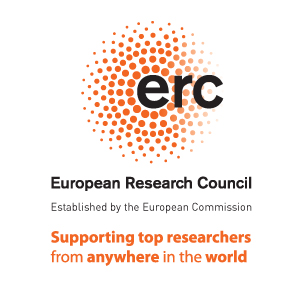Events
Lecture at the Centre for European Studies at the University of British Columbia
On 30th November 2022, as part of a Speaker Series on the theme Multicultural Ukraine, Elena Marushiakova gave a lecture at the Centre for European Studies at the University of British Columbia on the topic: Roma in Ukraine between a Eurasian Past and a Euro-Atlantic Future.
2022 Annual Meeting of the Gypsy Lore Society and Conference on Romani Studies
Belgrade, Serbia, from the 28th to the 30th of September 2022
Serbian Academy of Sciences and
Roma in the Period between WWI and WWII
- Convenors:
- Elena Marushiakova and Vesselin Popov, St Andrews University, UK
- Participants:
- Elena Marushiakova and Vesselin Popov. Roma civil emancipation before WWII. National and transnational dimensions.
- Yücel Meheroglu. The migration policy of the Young Turks regarding Ottoman and "Foreign" Gypsies (1908 –1912).
- Lambros Baltsiotis. Citizenship and statelessness of Gypsies in Interwar Greece.
- Nenad Lajbenšperger, The immovable cultural heritage of the Republic of Serbia and its connection to Roma.
- Plamena Stoyanova. Leaders among the Gypsies/Roma of Bulgaria in the years between the two World Wars.
- Raluca Bianca Roman. Forgotten pioneers? Roma civic emancipation and the role of Finnish Kaale women in the mobilisation of Finnish Roma at the start of the 20th century.
- Magdalena Slavkova. Romani women's Evangelical activities in interwar Bulgaria.
- Jekatyerina Dunajeva. The role of Churches in Roma education – faith-based schooling and Roma Identity in interwar Hungary.
- Tamás Hajnáczky. Károly Bura – Gypsy first violinist, activist, revisionist, and visionist.
- Ion Duminica. Roma nomads' way of life as reflected in three Romanian interbellum periodicals in contrast to contemporary testimonies.
- Petre Matei. The discourse of the Roma activists towards slavery in interwar Romania.
- Alexander V. Chernykh. The Kalderash Gypsies of Russia in the repressive policies of the Soviet state in the 1930s.
- Dmitriy Vaiman. The organisation of collective farms by Roma nomads during the period of Collective farm construction in the 1930s using the example of the collective farm "Krasny Vostok" of the Bashkir ASSR.
- Milada Závodská. The aspects of the institutional education of Roma in interwar Czechoslovakia and their related connections in the social standing of Romani families.
- Lada Viková. Ethical issues of the historical research of the Roms living in the Czech Republic between WWI and WWII.


Book Presentation
28th September 2022
Grand Hall at Serbian Academy of Sciences and Arts
Presentation of the books Roma Voices in History, Roma Writings, and Roma Portraits in History.
Convenor: Julieta Rotaru
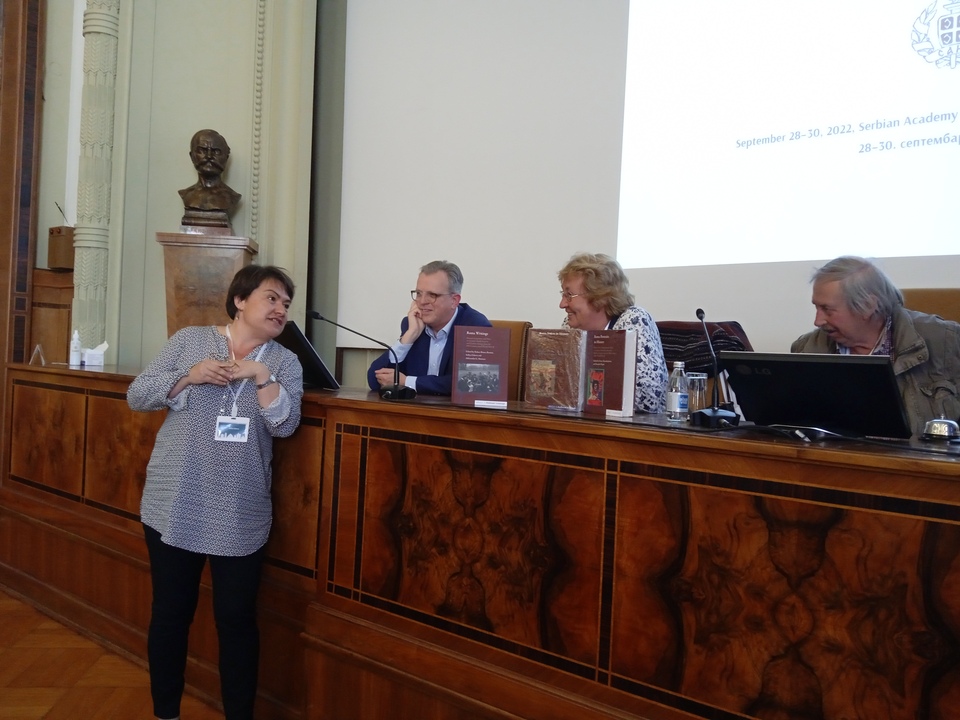
International Workshop
The international workshop was planned for 2020. It has been postponed due to Covid-19 and was organised on the 27th and 30th of September 2022. In the workshop participated, the collaborators and consultants of the RomaInterbellum project (Magdalena Slavkova-Ivanova, Raluca Roman, Tamás Hajnáczky, Ion Duminica, Viorel Achim, Lambros Baltsiotis, Risto Blomster, Plamena Stoyanova, Petre Matei, Elena Marushiakova, Veselin Popov, Lilyana Kovacheva, Lada Vikova, Yelis Erolova, Danilo Sarenac). The 27th of September was dedicated to discussions about the results of the project, difficulties and successes in working with archival sources, discoveries made and remaining challenges. On the 1st of October, the meeting was dedicated to discussing the impact of the project and future plans. Bearing in mind a positive experience, the participants unanimously found the need to continue networking even after the end of the project.
On the 1st of October 2022 we visited the sanctuary and memorial place of the Roma Sait, the Tetkica Bibija, which was established by the First Serbian Gypsy association in the 1920s.
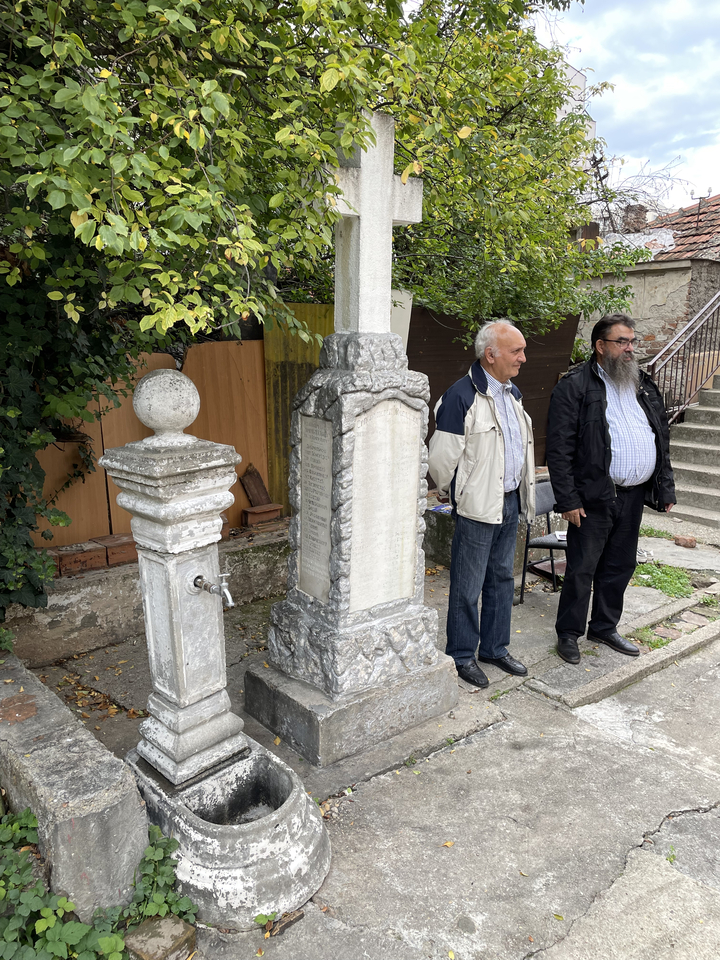

Central Eurasian Studies Society 7th Regional Conference
University of World Economy and Diplomacy Tashkent, Uzbekistan
June 25-28 2022
Elena Marushiakova and Veselin Popov took part at CESS conference with a presentation Central-Asian Gypsies in the Early Soviet Union.

Prizo ROMANIPE / ROMANIPE Award


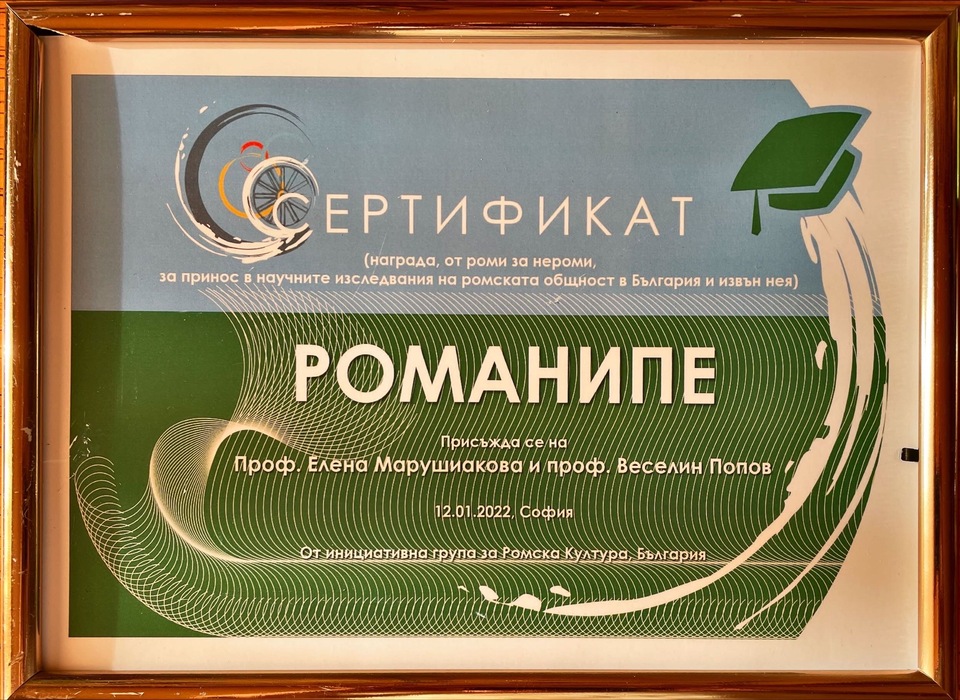
E iniciativno grupa pal ki Romani kultura andi Bulgariq, ko 12.01.2022 dingijas prizo ROMANIPE e profesorenge Elena Marushiakova thaj Veselin Popov o sebepi lengere akademikane rodipeta pal ko roma andi Bulgaria thaj ki lumija. O prizo del pes katar o roma gazhenge.
On January 12, 2022, the initiative group for Roma culture in Bulgaria presented the ROMANIPE award to Prof. Elena Marushiakova and Prof. Veselin Popov for their contribution to the research of the Roma community in Bulgaria and the world. The award is given by Roma to non-Roma.
American Library Association Award
The Best Historical Materials Committee of the Reference and User Services Association, an affiliate of the American Library Association selected as one of the Best Historical Materials published in 2020 and 2021 the book Marushiakova, Elena and Vesselin Popov, eds. 2021. Roma Voices in History: A Source Book. Roma Civic Emancipation in Central, South-Eastern and Eastern Europe from 19th Century until the Second World War. Leiden: Brill & Paderborn: Ferdinand Schöningh.

2021 Gypsy Lore Society Conference, 8–11 September 2021, Prague
Roma in the Period between WWI and WWII
Conveners: Elena Marushiakova and Vesselin Popov (School of History, University of St. Andrews, Scotland, UK)
This panel is a continuation of successful panels from 2018 and 2019 that also originated from the ERC project 'RomaInterbellum. Roma Civic Emancipation between the Two World Wars'. It aims at addressing one of the still under-researched topics in Romani Studies, namely the history of the Roma in the period between WWI and WWII. This period represented an era of significant changes worldwide, which encompassed numerous fields, such as, to list a few: the breakdowns of old Empires, re-drawing of borders, beginning of new world relations on a macro-level along with new inter-ethnic relations on micro-levels, huge movement of populations, the birth of new nation states, the rise of nationalism and internationalism, peace arrangements and exchange of populations, civil wars, important developments in interwar diplomacy and international relations, growth of economies, stagnation and depression, novel social, ideological and cultural trends and innovations, and others. This turnover not only marked the beginning of a new stage in world history but also, on a micro level, it impacted the living strategies and visions about the future of Roma communities worldwide.
The point of departure of this panel is the fact that Roma in their history were never a hermetically isolated social and cultural system. They existed, and continue to exist nowadays, in two dimensions. On the one hand the exist as separate ethnic communities, and on the other hand as part of the macro-societies in which they live within the respective nation-states. Along with the members of the macro-societies they experienced great changes and turbulences such as the breakdowns of old Empires, the establishment of nation states and processes of modernisation. In this time span, Roma started to be politically institutionalised, instrumentalised and subjected to a variety of controversial policy practices. Most importantly for this panel, at the same time they started to develop their own visions for the development of their communities, both on local and international levels.
This panel aims to bring together researchers from different disciplinary fields and it seeks to study the impact of the Interbellum period on Roma communities. The panel is specially interested in presentations that look at Roma not only as passive recipients of policy measures but also as active architects (agents) of their own lives. The aim is, together with papers studying evidences reflecting state policies in regard to Roma, to include presentations which analyse the appearance and development of social and political projects proposed by Roma.
Participants
- Acković, Dragoljub. The first Romologist of a Romani background in Serbia
- Achim, Viorel. Relations of Roma organizations with nomadic Roma in Romania in the 1930s
- Baltsiotis, Lambros. Early integration of sedentary Roma communities in Northern Greece
- Duminica, Ion. Ethno-social and cultural interwar ascending of the Romanian Roma through the Romani newspapers.
- Hajnáczky, Tamás. Journals published by Gypsy musicians in the first half of the 20th century in Hungary.
- Horváthová, Jana. They are Painful Memories
- Chernykh, Alexander V. The Gypsies of Russia during the interwar period: the regional case of Ural
- Kalinin, Valdemar; Board Edward. Aspects and the impact of the Romani literature during the period of Enlightenment [Renaissance], Soviet Union, (1925-1938)
- Marushiakova, Elena; Popov, Vesselin. In search of own state: Roma attempts to create autonomy before WWII
- Matei, Petre. Invoking the past for the present's sake. The case of the Roma movement in interwar Romania.
- Nam, Irina. The Criminal case fabricated against the Gypsies in Novosibirsk in 1938.
- Roman Raluca Bianca, Risto Blomster. A backdrop to civic activism? Roma voices within the Finnish 'Gypsy Mission' during the interwar period
- Segľová, Lucia. Romani in the Turiec region according to 1930 data census.
- Shapoval, Viktor. Moscow standard Romani and Smolensk correspondents of 1930s
- Stoica, Cristina. From Classification to Polarization: Romanian legislation targeting the Roma during the Interbellum.
- Stoyanova, Plamena. Epidemics and Gypsy neighbourhoods in Bulgaria (1918 - 1945)
- Tihovska, Ieva. Religion and employment of Latvian Roma during the authoritarian régime
- Vaiman, Dmitriy. Interwar period in historical legends of Kalderash Roma.
- Viková, Lada. "Our Family was a Sedentary": Politics towards Roma in the Interwar Czechoslovakia on the Example of Three Microhistorical Studies from Moravia
- Zahova, Sofiya. The Monument of 'Serbian Gypsy Youth to its Heroes' in the context of Yugoslav Romani activism in the interwar period.
Panel Roma Communities: Social Adaptation, Integration and Interactions organized at the 14th Congress of Anthropologists and Ethnologists of Russia (CAER), "Anthropology and Ethnology: Responding to Social Challenges"
The 14th Congress of Anthropologists and Ethnologists of Russia (CAER), titled "Anthropology and Ethnology: Responding to Social Challenges", took place in the city of Tomsk (Russia) from 6 to 9 July 2021, organised by the Association of Anthropologists and Ethnologists of Russia, National Research Tomsk State University and the Miklouho-Maklay Institute of Ethnology and Anthropology (Russian Academy of Sciences), with the support of the Administration of Tomsk region.
For the first time in this prestigious event a session devoted to Romani studies was organised, entitled Roma Communities: Social Adaptation, Integration and Interactions. Convenors of the session were ScDR. Alexandr Chernykh, Prof. Elena Marushiakova and ScDR Nadezhda Demeter.
In the session renowned Romani studies scholars from the Russian Federation, the Moldavian Republic, Ukraine, Romania and Bulgaria took part (a significant part of them from the team of ERC Advanced Grant RomaInterbellum, based at the University of St Andrews):
Presenters and titles of presentations
- Gutsalov Alexander Anatolyevich
- (Likhachev Russian Institute of Cultural and Natural Heritage, Southern Branch, Krasnodar). Specificity of the Roma population (on the example of the South of Russia)
- Demeter Nadezhda Georgievna
- (Institute of Ethnology and Anthropology named after N.N. Miklukho-Maclay RAS, Moscow). Gypsies of Russia: the language situation
- Duminica Ion
- (Institute of Cultural Heritage, Chisinau, Moldova). Publicistic portrayal of nomadic Gypsies in interwar Romania
- Kilin Alexey Pavlovich
- (Ural Federal University named after the first President of Russia B.N. Yeltsin, Yekaterinburg). Gypsy collective farms in the Urals in the 1930s: contradictions between diaspora and cooperative structures
- Kirill Kozhanov
- (Institute of Slavic Studies RAS, Moscow). Interaction of the Roma ethnic groups of Russia through the prism of language
- Marushiakova Elena
- (University of St Andrews, St Andrews, Scotland, Great Britain),
- Popov Veselin
- (University of St Andrews, St Andrews, Scotland, Great Britain). Towards the Issue of Oral History: the Case of the Gypsy Autonomous Republic in the USSR
- Ilona Yurievna Makhotina
- (Independent researcher, Tver). Opposition 'friend / foe' in the language and folklore of Russian Gypsies
- Nam Irina (Iraida) Vladimirovna
- (National Research Tomsk State University, Tomsk). Tomsk Gypsies in the early 2000s and today
- Smirnova Tamara Mikhailovna
- (St. Petersburg State University of Aerospace Instrumentation, St. Petersburg). Gypsy Leningrad: Acculturation Experience (1920s - 1930s)
- Stoyanova Galina Nikolaevna
- (Odessa National University named after I.I. Mechnikov, Odessa, Ukraine). Gypsies of Odessa: history and modernity
- Stoyanova Plamena
- (Institute for Ethnology and Folklore studies with Ethnographic Museum - Bulgarian Academy of Sciences, Sofia, Bulgaria). Gypsy workers' community in Sliven in the first half of the 20th century
- Chernykh Alexander Vasilievich
- (Perm Federal Research Center of the Ural Branch of the Russian Academy of Sciences, Perm). Gypsies-Kelderash of Russia in the 1920s-1930s: from nomadic tinkers to sedentary cooperators
- Shaidurov Vladimir Nikolaevich
- (A.S. Pushkin Leningrad State University, St. Petersburg). Gypsies of Siberia: problems of formation and development in the Imperial period
- Yakimov Andrey Nikolaevich
- (Charitable Foundation for the Support and Development of Educational and Social Projects "PSP-Fund", St. Petersburg). Socio-economic, ethnocultural and legal aspects of the integration of Roma ethnic groups in the Leningrad region in the context of harmonizing interethnic relations: the experience of practical study (based on the materials of a comprehensive study of 2016-2017)
- Roman Raluca Bianca
- (University of St Andrews, St Andrews, Scotland, UK). Civic emancipation and religious mobilisation among the Finnish Kaale (i.e. Finnish Roma) in Karelia at the start of the 20th century
- Erolova Yelis
- (Institute of Ethnology and Folklore Studies with Ethnographic Museum at Bulgarian Academy of Sciences, Sofia, Bulgaria).A Modern Tale about Vardun's Gypsies
- Zahova Sofiya
- (University of St Andrews, St Andrews, Scotland, UK). Community and Society Dimensions in the Activities of Belgrade Roma Organisations in Interwar Yugoslavia
The work of the session was considered extremely successful, and it was decided to go ahead with the publication of a conference proceeding. The fruitful exchanges between scholars, the familiarisation with different academic traditions and the mutual enrichment work of the session led to a decision to continue convening similar sessions on Romani studies also for subsequent congresses.
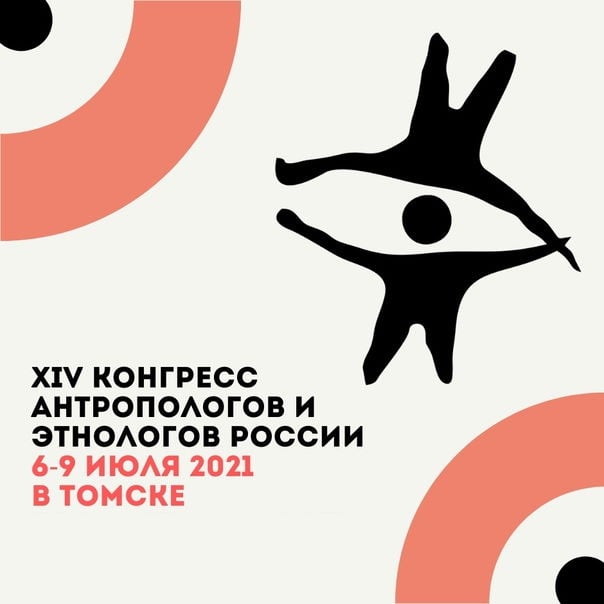
Roma Discussion Group workshop (1-2 June 2021)- Nationalism, belonging and Roma mobilisation
The Roma Discussion Group (RDG) is a group of early career (PhD students and postdoctoral) researchers working on various themes/issues concerning Roma, Gypsy and Traveller communities in Europe. Among its avenues of communication includes an online forum, and a mailing group for those taking part in the activities of the (RDG). RDG organises regular workshops and meetings, where speakers present their work in progress and receive feedback from experts in their field. These events have sometimes led to the publication of special issues in leading journals and edited volumes.
The workshop, 'Nationalism, Roma mobilisation and belonging', co-organised by Dr Katya Ivanova, Dr Raluca Roman and Can Yildiz, was a two-day event, on the themes of nationalism, belonging and Roma mobilisation in Europe. It comprised 9 panel speakers (PhDs and postdoctoral researchers), a keynote speaker (Prof. Colin Clark) and spanned over 2 day, on the 1st and 2nd of June, 2021. The workshop meeting also connects to the ongoing ERC Advanced Research Grand, 'RomaInterbellum' (PI Prof. Elena Marushiakova), based at the University of St Andrews.
Finally, the workshop connects well with a previous conference organised by Dr. Raluca Roman and Prof. Elena Marushiakova (Challenging issues in Roma/Gypsy studies today (The Byre Theatre, November 6th, 2015). That was an extremely successful event and the intention has long been to organise a follow up event in St Andrews. The proposed workshop's future activities would comprise the editing of either a Special Issue of a leading journal in the field (for the time being, 'Romani Studies' has been suggested) or of an edited Volume.
- Participants:
- Dr. Marko Stenroos (University of Helsinki)
- Dr. Jekaterina Dunajeva (Pázmány Péter Catholic University, Budapest)
- Dr. Petre Matei (Elie Wiesel Institute for the Study of the Holocaust in Romania/Vienna Wiesenthal Institute)
- Anca Loredana Enache (University of Helsinki)
- Dr. Manuela Marin (Babeș Bolyai University)
- Dr. Anthony Howarth (University of Cambridge)
- Dr. Antonio Montanes (University of St Andrews)
- Dr. Martin Fotta (Czech Academy of Sciences)
- Dr. Rosa Cisneros (Coventry University)
- Keynote:
- Prof. Colin Clark (University of the West of Scotland)
- Discussants:
- Dr. Paloma Gay y Blasco (University of St Andrews)
- Dr. Sofiya Zahova (University of Iceland/University of St Andrews)
- Dr. Marketa Dolezalova (University of Leeds)
- Prof. Elena Marushiakova (University of St Andrews).
- Organisers:
- Dr Katya Ivanova (London School of Economics)
- Dr Raluca Roman (University of St Andrews)
- Can Yildiz (King's College, London)
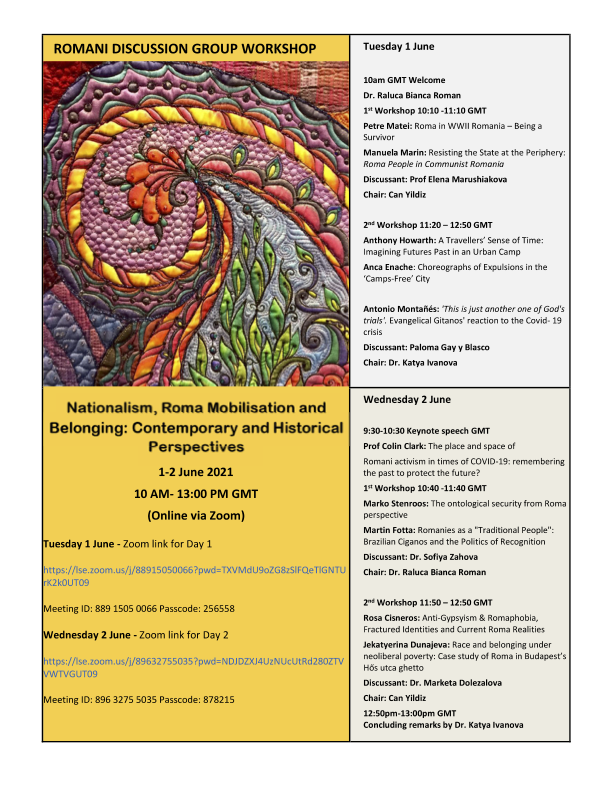
Conversation with Elena Marushiakova & Vesselin Popov about their new sourcebook, Roma Voices in History
Co-organized by the Prague Forum for Romani Histories, the Max Kade Center for European & German studies, Vanderbilt University, & the Seminar of Romani Studies, Department of Central European studies, Charles University.
Conversation with Elena Marushiakova & Vesselin Popov of St. Andrews University about their new sourcebook, Roma Voices in History.
Hosted by Ari Joskowicz (Vanderbilt University) & Helena Sadílková (Charles University).
Monday, April 19, 2021
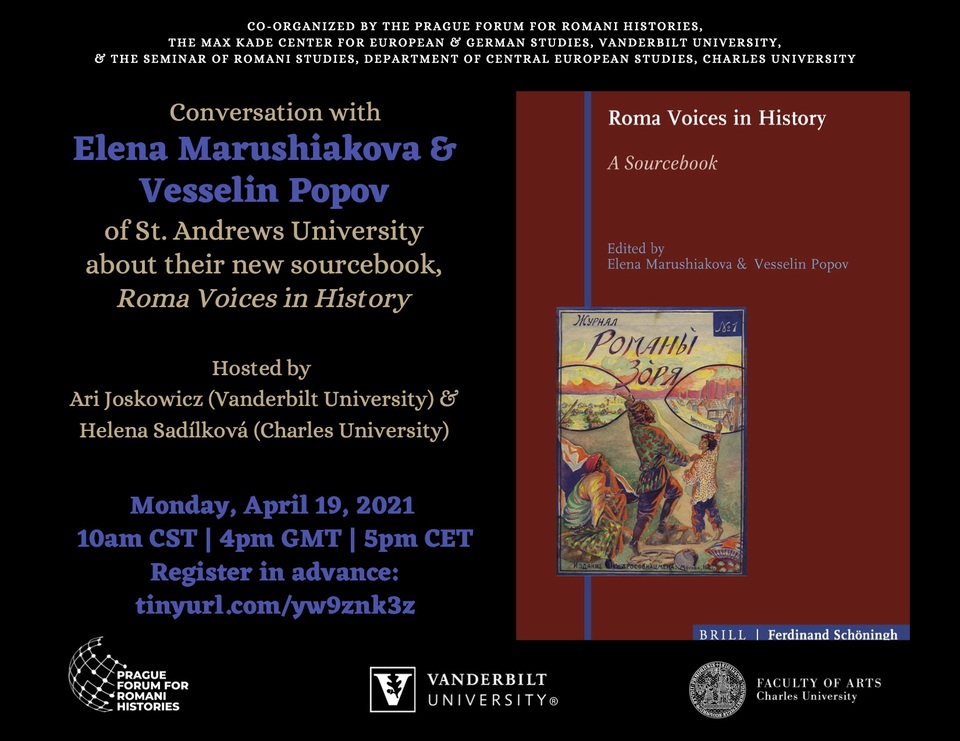
Doctor Honoris Causa Award for Prof. Elena Marushiakova
PI, Professor Elena Marushiakova received on the 7 February 2020 the Doctor Honoris Causa Award of Södertörn University in Stockholm for her great contribution to the Romani Studies.


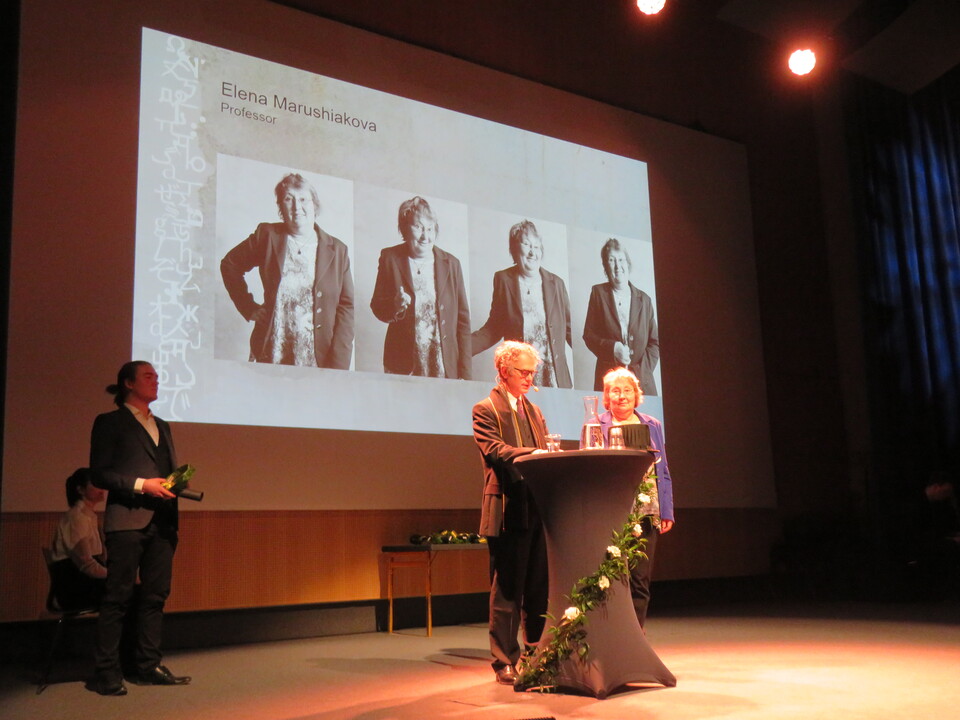
Annual Meeting of the Gypsy Lore Society and Conference on Romani Studies
From 15-17 August 2019, the Project team participated in the 'Annual Meeting of the Gypsy Lore Society and Conference on Romani Studies', hosted by the University of Iceland in Reykjavik. Professor Marushiakova managed to convene the largest, in this year's conference, special panel entitled: 'Roma in the Period between WWI and WWII' where a total of 16 speakers took part. As a whole, their research contributed with original and exciting research which promoted engaging discussions. The speakers were: Emine Dingeç with: 'Education of the Copts During the Last Period of Ottomans', Egemen Yılgür with: 'The State-Kıbti Relations in the Modernizing Ottoman Empire: Tax, Conscription and Denomination issues', Lada Viková with: 'Towards the theme of Czechoslovak Legionnaires (1914-1920) with Romani origin', Tamás Hajnáczky with: 'National Associations of Hungarian Gypsy Musicians 1918-1933 in Light of the Press', Plamena Stoyanova with: 'The first Communists among the Gypsies in Bulgaria', Raluca Bianca Roman with: 'From Christian mission to transnational connections: Evangelism, emancipation and social mobilisation in the inter-war publications of the Finnish "Gypsy Mission"', Iemima Ploscariu with Beserica Credința: the growth of Roma Baptists in Interwar Romania', Ieva Tihovska with: Jānis Leimanis and the "Awakening" of Latvian Roma, Petre Matei with: 'Roma Movement in Interwar Romania: Between Nationalism and Pragmatism', Viorel Achim with: 'Relations between local-level and national-level Roma organisations in Romania in the 1930s', Ion Dominica with: 'Romanian Roma Congress from 1933 in archival and media sources', Viktor Shapoval with: 'Enthusiasm and frustration: Soviet Romani cultural Renaissance of 1925-1938 in the context of everyday life', Elena Marushiakova and Veselin Popov with: 'Can a non-Rom be the Progenitor of Romani literature: The Case of Alexander Germano', Alexander V. Chernykh with: 'The Kalderash Gypsies of Russia in the process of industrial cooperation in the 1920-1930s', and Aleksandar G. Marinov with: 'Images of Roma through the language of the Bulgarian State Archives'.

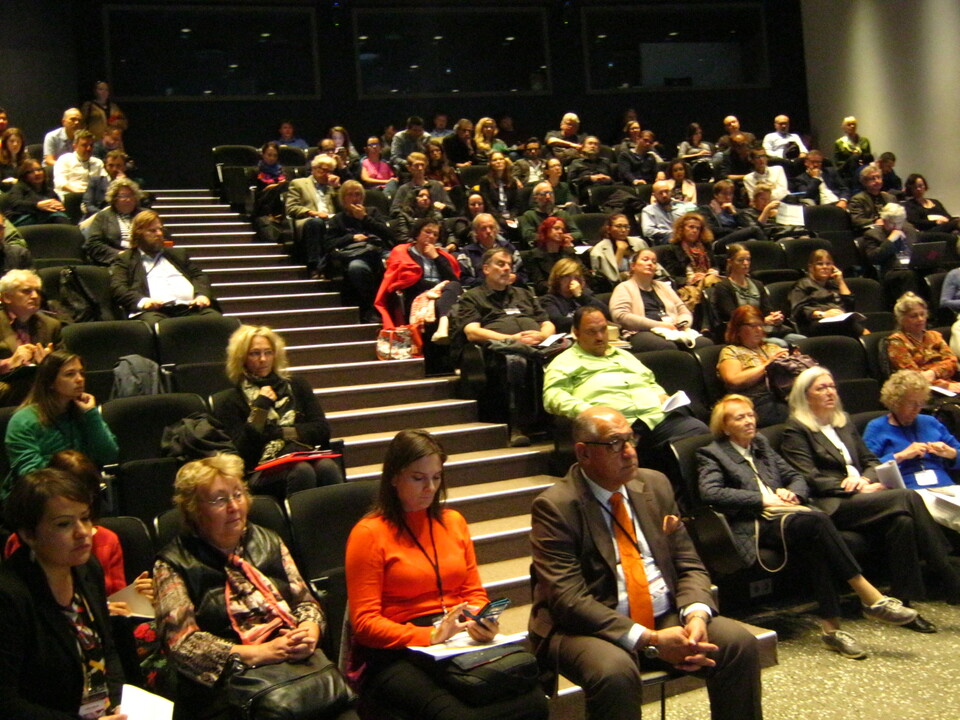

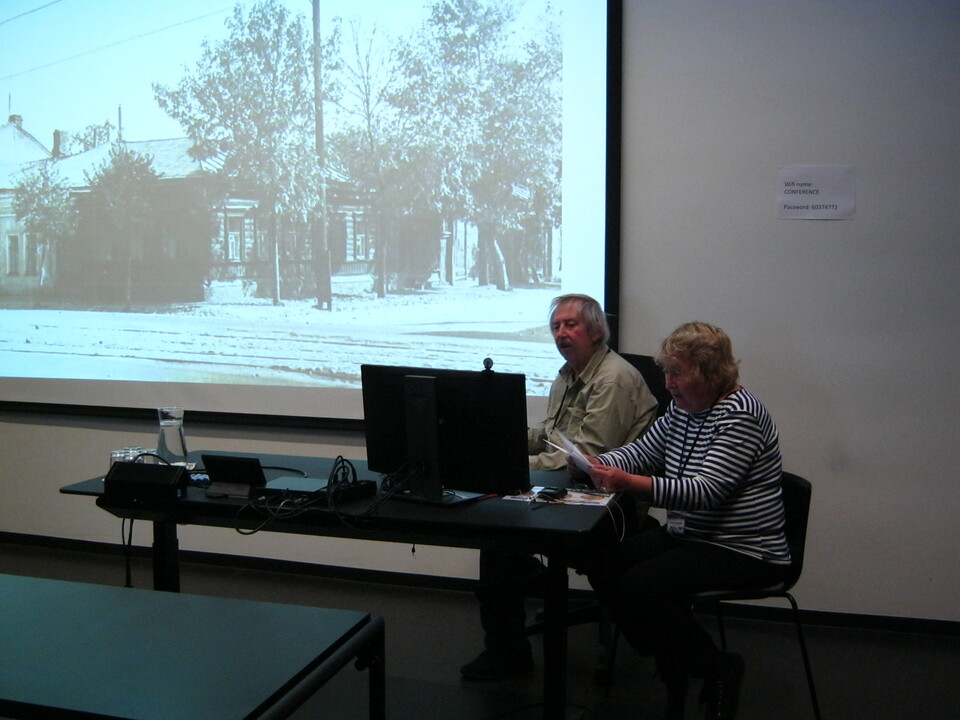
Association for the Study of Nationalities World Convention
From 2-4 May 2019, the team of the project took part in the 'Association for the Study of Nationalities World Convention', hosted by Columbia University in New York, USA, in the special panel 'Roma Civic Emancipation between the Two World Wars'. Professor Elena Marushiakova and Professor Veselin Popov presented on 'Letter to Stalin: Roma Visions on Gypsy Policy in the Early USSR'; Dr Raluca Bianca Roman talked on '"The voice of the Roma"? National Identity, Ethnic Building and Regional Politics within Roma-led Publications in Interwar Romania'; while Dr Sofiya Zahova gave a talk entitled 'Romani Self-representation in the "Gypsy Newspaper" of Interwar Yugoslavia'.
International Workshop - Roma Civic Emancipation between the Two World Wars: Challenges in Archival Research of Roma.
Date: 26-27 October 2018
The workshop was held in the University of St Andrews on 26th and 27th October and was organised as part of the ERC Advanced Grant Project (2015, Nr. 694656) RomaInterbellum (Full Title: Roma Civic Emancipation between the Two World Wars). Despite the rapid developments in the field of Romani Studies in recent years, there are still under-researched topics such as the history of the Roma in the period between WWI and WWII as well as the appearance and development of social and political projects proposed by the Roma. The workshop had the goal to fill in this gap. The departing point of our research is the circumstances that Roma are not a hermetically isolated social and cultural system. They exist in two dimensions, both as separate ethnic communities and as a part of the macro-society in which they live within the respective nation-states. We consider Roma as an inseparable part of the mainstream history and their socio-political visions as part of the history of modern political thought in Europe. The workshop intended to discuss the availability and the specific issues related to the historical sources which were found pertaining to the Interwar period.


The event was used to discuss practical and methodological concerns of archival work, as well as to share experiences and practical and methodological challenges of conducting archival research in individual countries. It sought to create a space for dialogue, exchange of ideas and concepts on some of the most challenging and controversial topics in this regard.
Also, from a practical point of view, the workshop was used to discuss the compilation of a Source Book which is envisaged to be published under the framework of the RomaInterbellum project. A working meeting by the Research Fellows working on the theme of Roma literature and media also took place.
Explorathon

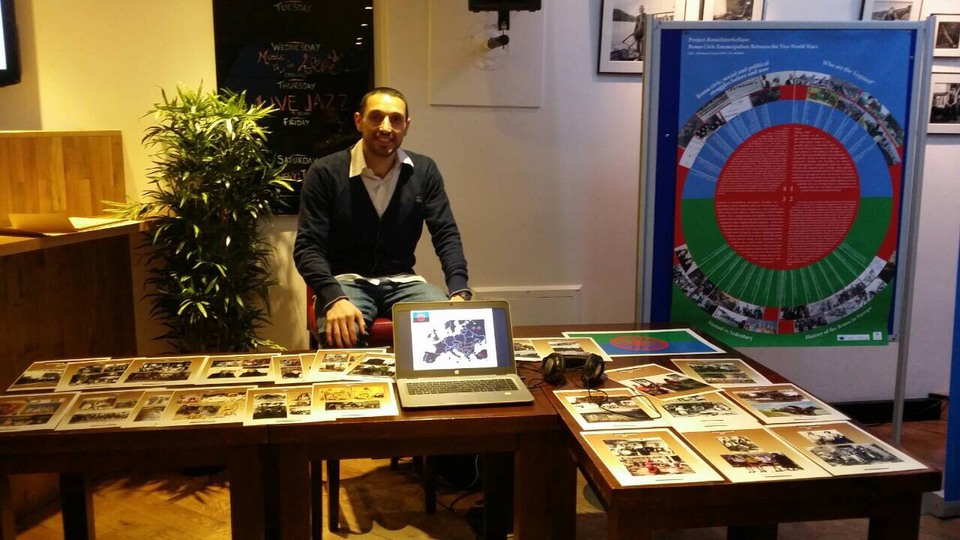
On September 29th 2017 the project team took part in the annual Explorathon, European Researchers' Night 2017 where we discussed the aims of the project with the wider community at St Andrews.
The Explorathon is a European Commission funded event which takes place across Europe and its neighbouring countries and is "dedicated to popular science and fun learning". Approximately 30 countries and over 300 cities, including St. Andrews, took part in the event.



